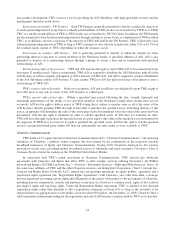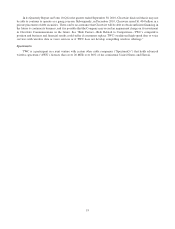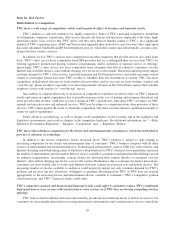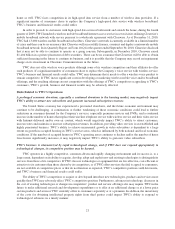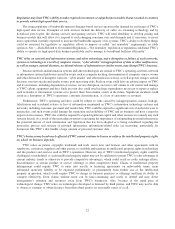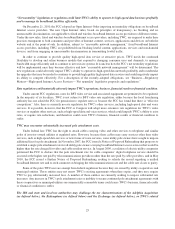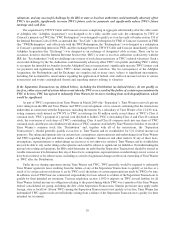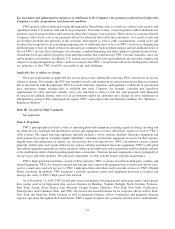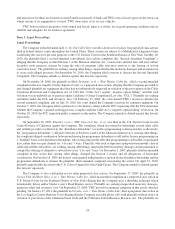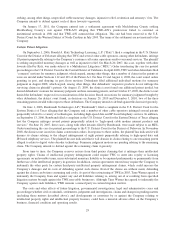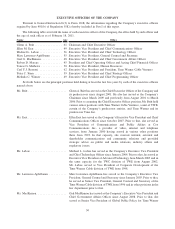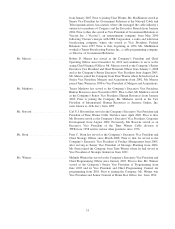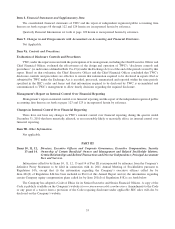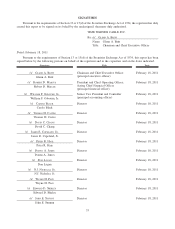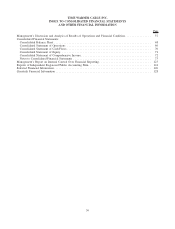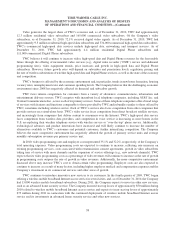Time Warner Cable 2010 Annual Report Download - page 40
Download and view the complete annual report
Please find page 40 of the 2010 Time Warner Cable annual report below. You can navigate through the pages in the report by either clicking on the pages listed below, or by using the keyword search tool below to find specific information within the annual report.and microwave facilities are located on owned and leased parcels of land, and TWC owns or leases space on the towers on
which certain of its equipment is located. TWC owns most of its service vehicles.
TWC believes that its properties, both owned and leased, taken as a whole, are in good operating condition and are
suitable and adequate for its business operations.
Item 3. Legal Proceedings.
Legal Proceedings
The Company is the defendant in In re: Set-Top Cable Television Box Antitrust Litigation, ten purported class actions
filed in federal district courts throughout the United States. These actions are subject to a Multidistrict Litigation Order
transferring the cases for pre-trial purposes to the U.S. District Court for the Southern District of New York. On May 10,
2010, the plaintiffs filed a second amended consolidated class action complaint (the “Second Amended Complaint”),
alleging that the Company violated Section 1 of the Sherman Antitrust Act, various state antitrust laws and state unfair/
deceptive trade practices statutes by tying the sales of premium cable television services to the leasing of set-top
converters boxes. The plaintiffs are seeking, among other things, unspecified treble monetary damages and an injunction
to cease such alleged practices. On September 30, 2010, the Company filed a motion to dismiss the Second Amended
Complaint. The Company intends to defend against this lawsuit vigorously.
On November 14, 2008, the plaintiffs in Mark Swinegar, et al. v. Time Warner Cable Inc., filed a second amended
complaint in the Los Angeles County Superior Court, as a purported class action, alleging that the Company provided to
and charged plaintiffs for equipment that they had not affirmatively requested in violation of the proscription in the Cable
Consumer Protection and Competition Act of 1992 (the “Cable Act”) against “negative option billing” and that such
violation was an unlawful act or practice under California’s Unfair Competition Law (the “UCL”). Plaintiffs are seeking
restitution under the UCL and attorneys’ fees. On February 23, 2009, the court denied TWC’s motion to dismiss the
second amended complaint, and on July 29, 2010, the court denied the Company’s motion for summary judgment. On
October 7, 2010, the Company filed a petition for a declaratory ruling with the FCC requesting that the FCC determine
whether the Company’s general ordering process complies with the Cable Act’s “negative option billing” restriction. On
October 20, 2010, the FCC requested public comment on this matter. The Company intends to defend against this lawsuit
vigorously.
On September 20, 2007, Brantley, et al. v. NBC Universal, Inc., et al. was filed in the U.S. District Court for the
Central District of California against the Company. The complaint, which also named as defendants several other cable
and satellite providers (collectively, the “distributor defendants”) as well as programming content providers (collectively,
the “programmer defendants”), alleged violations of Sections 1 and 2 of the Sherman Antitrust Act. Among other things,
the complaint alleged coordination between and among the programmer defendants to sell and/or license programming on
a “bundled” basis to the distributor defendants, who in turn purportedly offer that programming to subscribers in packaged
tiers, rather than on a per channel (or “à la carte”) basis. Plaintiffs, who seek to represent a purported nationwide class of
cable and satellite subscribers, are seeking, among other things, unspecified treble monetary damages and an injunction to
compel the offering of channels to subscribers on an “à la carte” basis. On December 3, 2007, plaintiffs filed an amended
complaint in this action that, among other things, dropped the Section 2 claims and all allegations of horizontal
coordination. On October 15, 2009, the district court granted with prejudice a motion by the distributor defendants and the
programmer defendants to dismiss the plaintiffs’ third amended complaint, terminating the action. On April 19, 2010,
plaintiffs appealed this decision to the U.S. Court of Appeals for the Ninth Circuit. The Company intends to defend against
this lawsuit vigorously.
The Company is also a defendant in two other purported class actions. On September 17, 2009, the plaintiffs in
Jessica Fink and Brett Noia, et al. v. Time Warner Cable Inc., filed an amended complaint in a purported class action in
U.S. District Court for the Southern District of New York alleging that the Company uses a throttling technique which
intentionally delays and/or blocks a user’s Road Runner service. Plaintiffs are seeking unspecified monetary damages,
injunctive relief and attorneys’ fees. On September 25, 2009, TWC moved for summary judgment in this action, which is
pending. On January 27, 2011, the plaintiffs in Calzada, et al. v. Time Warner Cable LLC, filed a purported class action in
the Los Angeles County Superior Court alleging that the Company recorded phone calls with plaintiffs without notice in
violation of provisions of the California Penal Code and the California Unfair Business Practices Act. The plaintiffs are
28


